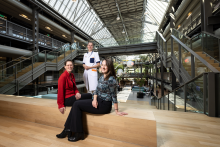Women’s Health or Gender Medicine, which studies how diseases differ between men and women, is becoming one of the new focal points at the University of Twente. As the first step towards a UT-wide women’s health research mission, every scientist working on the topic is invited to join Women’s Health Research Day next week.
What is women’s health?
Jonker: ‘It deals with diseases that occur only or mainly in women, such as gynecological diseases, breast cancer, ovarian cancer and osteoporosis. The field also seeks better understanding of why diseases manifest differently in women and in men. This is true for cardiovascular diseases, for instance. If women get a heart attack, they often get nauseous but that is not considered one of the symptoms and they get improperly diagnosed. The approach to healthcare should be viewed from the women’s perspective.’
Siesling: ‘Women have been underrepresented in medical research and innovation, which is traditionally tailored to men. Healthcare seeking behavior of women is also different from men.’
Jonker: ‘Exactly. We always say that women live longer – and they do – but they fall ill much earlier. Women also experience higher complication rates. For example, they are 50-75% more likely to have adverse reaction to medication.’
How old is the field of gender medicine?
Jonker: ‘It has existed for nearly 25 years, but it has received more focus in the last couple of years, because organizations such as the WHO and European Commission have put the topic on their agenda.’
What are the main topics explored within women’s health?
Siesling: ‘There are many research programmes focused on understanding why diseases and medication affect women differently. At the UT, however, we have a unique position. Here we focus mostly on data and technology in women’s health. Data and technology have been male dominated, but women’s perspective is quite different in this regard.’
How many UT scientists work on topics related to gender medicine? What kind of research do they do?
Siesling: ‘The University of Twente recently started a new program on Key Enabling Technologies for Personalized Medicine. One of the pillars in this program is the field of Women’s Health or Gender Medicine. Some of the topics we work on here are breast cancer detection, lactation problems and pelvic floor defects.’
Jonker: ‘The event next week is our first gathering. We have invited thirty researchers so far. There might be more, though. Hopefully the event will allow us to create a more comprehensive list.’
You are working on a UT-wide women’s health research mission. Do you hope it will become one of the university’s field of expertise?
Jonker: ‘We want to gather the community and establish a common vision and mission, something the whole UT can get behind. We want to involve external stakeholders and reach out to the target group itself, so that we can map what women really need. Hopefully having a joint mission will also help us to get funding and to achieve better care for women.’








